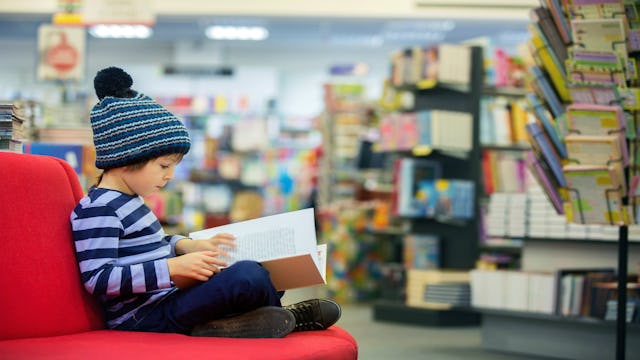My Kid Isn't Reading, But That Doesn't Mean He's Behind

At almost 6 years old, my darling August does not know all his letters. Some of my relatives are concerned about him, especially since my oldest read early. They feel like he’s deficient or like I’m not paying as much attention to him. If we didn’t homeschool, August would enter kindergarten without working knowledge of the alphabet or its sounds. In other words, he’d already be “behind” even before he’d began.
But this is bullshit. My 5-year-old is not a deficient reader. He’s a normal 5-year-old.
Our expectations have been skewed, and though it’s been happening for a long time, the institution of George W. Bush’s No Child Left Behind Act, with its emphasis on testing and accountability, really gave kindergarten that push to become, as some say, the new first grade. New York Magazine reports that in 2010, “teachers were about 33% more likely” than their 1998 counterparts to think that kids needed to enter kindergarten knowing both how to hold a pencil and the alphabet. Hell, I remember learning the alphabet in kindergarten in the 1980s, and singing songs like “Mr. M, with the munching mouth.”
Nowadays, forget songs about Mr. M and his alphabet friends. If your kid isn’t already well-acquainted with the alphabet and on their way to reading, they’re already behind.
This is in sharp contrast to other countries. American kindergarten has become more academic at the expense of play, contends “The Joyful, Illiterate Kindergarteners of Finland,” with a full 80% of teachers believing in 2010 that kids should actually learn to read in kindergarten. Finland’s kids, unlike Americans, start school not at age 5, but 6 — and spend their time in kindergarten (or what they call “preschool”) playing. Teachers say they learn through play, something research supports.
“Learning with joy” is explicitly written into Finnish schools’ curriculum, and as one teacher says, “The things you learn without joy you will easily forget.” The kids can learn reading if they’re ready and willing, but it’s not something that’s emphasized. In fact, most children in Finland leave kindergarten — at an age American kids are graduating first grade — still flipping through books for the pictures.
Yet Finland has long earned top performance scores on international tests, and Business Insider ranks Finland’s schools as the best in the world. According to the Huffington Post, Finland is the second-most-literate society on earth, at 94%, whereas 32 million Americans — or 14% of us — can’t read, and 21% of adults read at a fifth-grade level. So clearly their laissez faire attitude about reading isn’t a problem.
In a video put out by the advocacy group Defending the Early Years, Nancy Carlsson-Paige, a professor emeritus of early childhood education at Lesley University, says, “There isn’t any solid evidence that shows that children who are taught to read in kindergarten have any long-term benefit from it.” One researcher found that children taught to read at age 7 and children taught to read at 5 five demonstrated “equivalent reading skills” by 11. Yet in the U.S., kids in 2010 were 15% more likely to use a reading workbook on a daily basis at age 5 than they were in 1998. Why?
As professor Bev Brenna at the University of Saskatchewan, told Today’s Parent, there simply isn’t one age where kids can or should be reading. One homeschooler talks about her son struggling at age 7, but teaching himself to read fluently at age 9. Her other child is just muddling through the beginnings of reading at 8. She says she “often hears of home-schooled kids learning to read at about age 9 — and going on to complete high school and attend university without any negative effects.”
I have a dear friend who was unschooled, or not formerly taught lessons, but left to find his own interests and learn about them with help. He and his siblings decided to learn to read when they were 10, and using Charles Dickens, they succeeded admirably. Today, my friend holds both a graduate degree and a dream job as a field biologist.
So if you’ll excuse me when I don’t label my August slow, deficient, or lazy. He’s just not ready to read. We’re doing Teach Your Child to Read in 100 Easy Lessons, which I did with my oldest, which is hard, but worth it. It teaches all the letters and sounds and how to put those suckers together to make words. August bitches and moans and gets distracted, but then tells my husband that he’s a great reader and soon he’ll be able to read like his brother. He can’t yet identify the letter Z in a lineup or tell you what sound it makes. He can’t spell his name, much less write it. In fact, he can’t write most of his letters. And still I refuse to label him a slow reader.
Yes, it’s hard when other moms brag about their kid’s reading, but then I remember Finland’s educational philosophy and my field biologist friend’s story of success. I ask August if he’d like to practice letters using glue, buttons, or PlayDoh, and we continue working. August is right where he needs to be, and if he doesn’t conform to American expectations for reading, well, fuck it.
I’d much prefer my child be an engaged, motivated, and joyful learner over an early reader any day. August will be better off if I let him be, wait until he shows serious interest in reading, and encourage him to play while mixing in some early-literacy activities.
He’s not behind at all. My kid is right on track — his track.
This article was originally published on